Understanding and Managing Gingival Fibromatosis Dominant
For individuals impacted by Gingival Fibromatosis Dominant, understanding the condition and available treatment options is crucial. This article will guide you through the signs, diagnosis, oral surgery preparation, post-surgery care, long-term prognosis, and lifestyle tips for managing this disease effectively.
Introduction to Gingival Fibromatosis Dominant
Gingival Fibromatosis Dominant is a rare genetic disorder characterized by the overgrowth of gum tissue. This condition can lead to aesthetic concerns, challenges in oral hygiene maintenance, and potential difficulties in speaking or eating. It is crucial to seek professional help to properly diagnose and manage this condition. Genetic counseling may be recommended to understand the inheritance pattern and potential risks for family members. Through early detection and intervention, individuals with Gingival Fibromatosis Dominant can receive appropriate treatment to improve their oral health and quality of life.
Signs and Symptoms
Recognizing the signs and symptoms of Gingival Fibromatosis Dominant is essential for early intervention. Common indicators include a significant increase in gum tissue, leading to a ″bulldog″ or ″coarse″ appearance of the gums. Individuals may experience difficulty in fully closing their mouth, which can impact speech and eating. Other symptoms may include gum inflammation, tooth displacement, and challenges in maintaining proper oral hygiene due to the excessive gum tissue. If you notice any of these signs, seek professional dental advice promptly for a thorough evaluation and personalized treatment plan.
Diagnosis and Treatment Options
Diagnosing Gingival Fibromatosis Dominant involves a comprehensive dental examination, including a review of medical history and genetic testing. A biopsy of the affected gum tissue may be necessary to confirm the diagnosis. Once diagnosed, treatment options vary and may include non-surgical approaches such as regular professional cleanings, orthodontic intervention, and close monitoring of oral health. In more severe cases, oral surgery may be recommended to reduce excess gum tissue and restore oral function and aesthetics. It is crucial to consult with a qualified oral surgeon to discuss the most suitable treatment plan based on your individual case and preferences. Collaborate closely with your dental care team to ensure proper management and optimal outcomes.

Preparing for Oral Surgery
Preparing for oral surgery to address Gingival Fibromatosis Dominant involves several key steps to ensure a smooth and successful procedure. Before the surgery, your oral surgeon will provide detailed instructions on pre-operative care, which may include fasting for a specific period and adjusting medications if necessary. It is essential to follow these guidelines closely to minimize any risks during the surgery. Be sure to discuss any concerns or questions with your healthcare team to clarify any doubts and ease any anxieties before the procedure. Additionally, arrange for transportation to and from the surgical facility, as you may not be able to drive after undergoing oral surgery. By preparing adequately and following your surgeon’s recommendations, you can help ensure a positive outcome and enhance the recovery process post-surgery.
Post-Surgery Care and Management
After undergoing oral surgery for Gingival Fibromatosis Dominant, diligent post-operative care is crucial for optimal healing and successful outcomes. Your oral surgeon will provide you with detailed instructions on managing pain, swelling, and potential bleeding following the procedure. It is essential to follow these guidelines carefully, including taking prescribed medications as directed and maintaining proper oral hygiene practices to prevent infection. Stick to a soft diet initially and gradually transition to regular eating habits as advised by your healthcare provider. Attend all scheduled follow-up appointments to monitor your healing progress and address any concerns promptly. Remember to avoid strenuous activities and be gentle with your oral tissues during the recovery period. By prioritizing your post-surgery care and adhering to your surgeon’s recommendations, you can promote effective healing and long-term oral health.
Long-Term Prognosis and Follow-Up
Understanding the long-term prognosis of Gingival Fibromatosis Dominant is vital for ongoing management and oral health maintenance. Following oral surgery or other treatment interventions, regular follow-up visits with your oral surgeon and dentist are essential to monitor your condition and address any potential complications promptly. Your healthcare team will assess the healing progress, check for recurrence of gum overgrowth, and provide guidance on maintaining optimal oral hygiene practices. It is crucial to adhere to your follow-up schedule and communicate any changes or concerns regarding your oral health to ensure timely intervention if needed. By actively participating in your long-term care plan and staying proactive about your oral health, you can maximize the outcomes of your treatment and enjoy improved oral function and aesthetics in the long run.
Lifestyle and Oral Health Tips
Maintaining a healthy lifestyle and practicing good oral hygiene are essential components of managing Gingival Fibromatosis Dominant. To support your oral health, consider incorporating a balanced diet rich in vitamins and minerals to promote overall wellness and aid in tissue healing. Avoid tobacco products and limit sugary or acidic foods and beverages to protect your gums and teeth from potential damage. Implement a consistent oral hygiene routine, including regular brushing, flossing, and using antimicrobial mouthwash to prevent plaque buildup and reduce the risk of gum disease. Stay hydrated by drinking an adequate amount of water daily to help flush out bacteria and maintain optimal oral moisture. Additionally, prioritize stress management techniques as stress can impact oral health. Consult your dental care team for personalized recommendations and guidance on lifestyle adjustments tailored to your unique needs. By adopting these lifestyle and oral health practices, you can support the management of Gingival Fibromatosis Dominant and enhance your overall well-being.
